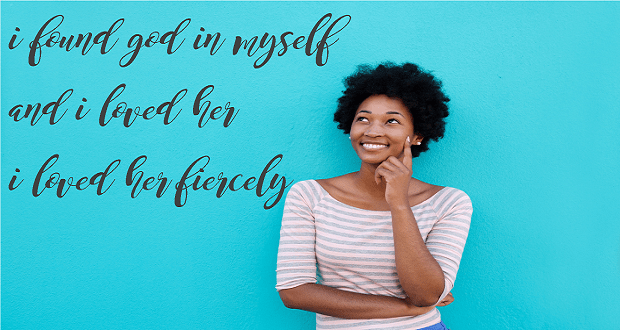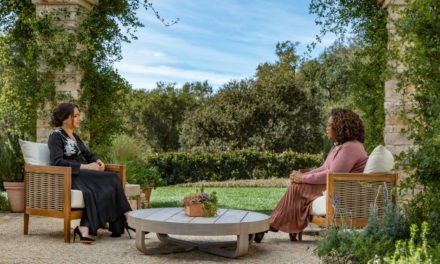
There are some words that remain with us long after we have read or heard them spoken. Sometimes, they surface in challenging moments, as a source of inspiration and encouragement. At other times, we may call upon these words for guidance or reassurance as we navigate different situations in our professional and personal lives. As a writer, I have always been fascinated with the palpable power of words, and the influence they have over us.
Whether written or spoken, influential quotes have a way of permeating our worldview. One such quote that I have regarded as particularly meaningful in my life is from Ntozake Shange’s For Colored Girls Who Have Considered Suicide / When The Rainbow is Enuf:
[dropshadowbox align=”center” effect=”horizontal-curve-bottom” width=”400px” height=”” background_color=”#00d6e7″ border_width=”1″ border_color=”#dddddd” ]i found god in myself / and i loved her / i loved her fiercely[/dropshadowbox]
In her choreopoem consisting of twenty separate poems, Shange explores life from the perspective of 7 different African-American women, who are identified only by the colors of their garments. Although the women are nameless, they each are easily recognized by the style of the writing within each poem. Shange also cleverly twists the adjective of “Colored” in her title, recalling earlier, historical uses of the term as an adjective primarily used to describe individuals of African-American descent in the U.S. Although Shange’s work explores arduous themes such as racism, marginalization, domestic violence, abortion, rape, and heartbreak, there is a constant thread of hope and the importance of self-identity that is woven throughout the poem. In their “colors of the rainbow”, the women in Shange’s poems boldly confront the oppression that confronts them outwardly – and in some cases, within themselves.
Growing up, I had no desire to be different. As a military child, I was always “the new kid” and somehow found myself in the situation every two to four years of making new friends. At each new school, I found myself daydreaming about re-inventing myself from the shy, spectacled young girl who loved reading, and often found myself admiring the more outspoken members of my class. During class discussions on culture, I found myself shrinking into my chair and trying to be as small as possible. It wasn’t that I didn’t admire my history or the pride my family had instilled in me about my ancestors – I just wanted to be “normal”! I didn’t realize it was the diversity in my experiences that would later shape my life and career. It was only through strong women – teachers, mentors, and peers – that I would realize the importance of self-acceptance, speaking my “truth”, and taking bold risks.
In many communities, self-love and acceptance are values that are espoused but sometimes difficult to realize. When I first read the above line in For Colored Girls, I scribbled it down in my journal. From there, it moved to an index card I kept as a reminder at my desk. Today, the quote is written on a Post-It note that I keep on my bedroom mirror. It is a reminder that my own confidence and, frankly, self-love, should be and must be a daily priority.
Data continues to confirm that women’s’ self-perception, and particularly those views that have been developed during childhood, strongly influence the development of key leadership competencies. From a young age, women are socialized to be “nice” and focus on the needs of others over themselves. Women are also typically characterized as being more risk-averse than men. For professional services firm KPMG, chief among the suggestions for more effective leadership development for women included praise and encouragement from female role models.
Throughout my life, I have been lucky to have both informal and formal mentors and champions who have encouraged me to look past fear and be more fierce in my own convictions, goals, and values. These women have inspired me to ask the question, “Why Not?”. One mentor that sticks out clearly is a professor from my undergraduate years who pushed me to explore the intersectionality of race and gender through a language I knew best – literature. For this particular professor, there was never a one- word answer, and she pushed me to come out of my shell in class and feel more comfortable about having real, authentic conversations about race and gender, which were topics I previously had intentionally avoided in discussion. Although I initially felt uncomfortable with what I deemed as “probing”, her encouragement led me to further explore courses in African American Studies, which led to my interest in engaging within the diversity & inclusion space in my professional career.
Through the exploration of works such as For Colored Girls, I was able to come face to face with some of my own biases and fears and more critically interrogate assumptions that I had about myself. Something about Shange’s words touched me. Fierce love. What would it mean for me to accept myself, completely? To understand that it was okay (and a good thing!) to be different? I learned that, in many cases, my greatest enemy was my own fears – fears of what others might say, fears of not having the right tools to speak about my experiences, and even fears that my opinions would not be valued or even understood. Each day, in this particular class, I made a goal of contributing just one thought to the discussion. Then two. Then three. And then one day, I was able to engage in the dialogue without counting.
While being bold might be difficult, the alternative is to sit as a passenger in the story of our lives. I have learned that we gain nothing from fear, and that in our boldness, we are often able to enable others to be bold as well.
This Women’s History Month, I implore you to consider the mentors and champions in your lives who have made a difference to you. I also encourage you to think about how you can encourage others to be bold, love fiercely, and find love within themselves to continue to learn, grow, and develop independent of our fears.


















